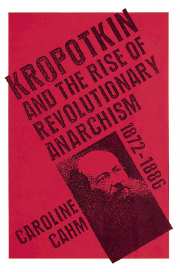Book contents
- Frontmatter
- Contents
- Preface
- Acknowledgements
- Introduction
- Part I Kropotkin and the development of the theory of anarchist communism
- Part II Kropotkin and the development of anarchist ideas of revolutionary action by individuals and small groups (1872–1886)
- Part III Kropotkin and the development of anarchist views of collective revolutionary action (1872–1886)
- 9 Trade unionism and the emergent anarchist movement of the seventies
- 10 Kropotkin and collective action in the labour movement
- Conclusion
- Notes
- Bibliography
- Index
9 - Trade unionism and the emergent anarchist movement of the seventies
Published online by Cambridge University Press: 14 September 2009
- Frontmatter
- Contents
- Preface
- Acknowledgements
- Introduction
- Part I Kropotkin and the development of the theory of anarchist communism
- Part II Kropotkin and the development of anarchist ideas of revolutionary action by individuals and small groups (1872–1886)
- Part III Kropotkin and the development of anarchist views of collective revolutionary action (1872–1886)
- 9 Trade unionism and the emergent anarchist movement of the seventies
- 10 Kropotkin and collective action in the labour movement
- Conclusion
- Notes
- Bibliography
- Index
Summary
Revolution by the spontaneous action of the masses was a central feature of European anarchist communism so that there was always some ambivalence towards the labour movement, which, for all its potentiality for mobilising the masses, often tended to be moderate in its aims and authoritarian in its organisation. The anarchists, however, though sharply critical of the labour movement, particularly during the 1880s when many became distrustful of any sort of formal organisation, generally speaking did not fail to appreciate the importance of working-class association in militant activity like strikes. Indeed, a sort of revolutionary syndicalism emerged from the bakuninism of the 1870s which even if it was somewhat eclipsed, even in Spain, by the preoccupation with action by individuals and small groups in the eighties, was to come into its own in the next decade.
Bakuninist ideas about trade unions seem to have developed from those expressed in the First International. Certainly Bakunin's discussion of the role of trade unions in the International, particularly in his articles for L'Egalité in 1869, would appear to contain at least in part an elaboration of the views expressed at the Congress of Brussels in 1868 and the Congress of Basle in 1869.
The subject of trade union organisation and activity had been discussed in some detail at Brussels in 1868 in connection with the question of strikes.
- Type
- Chapter
- Information
- KropotkinAnd the Rise of Revolutionary Anarchism, 1872-1886, pp. 213 - 230Publisher: Cambridge University PressPrint publication year: 1989



